Politics
Nolan’s ‘Oppenheimer’ wins best picture at the Oscars
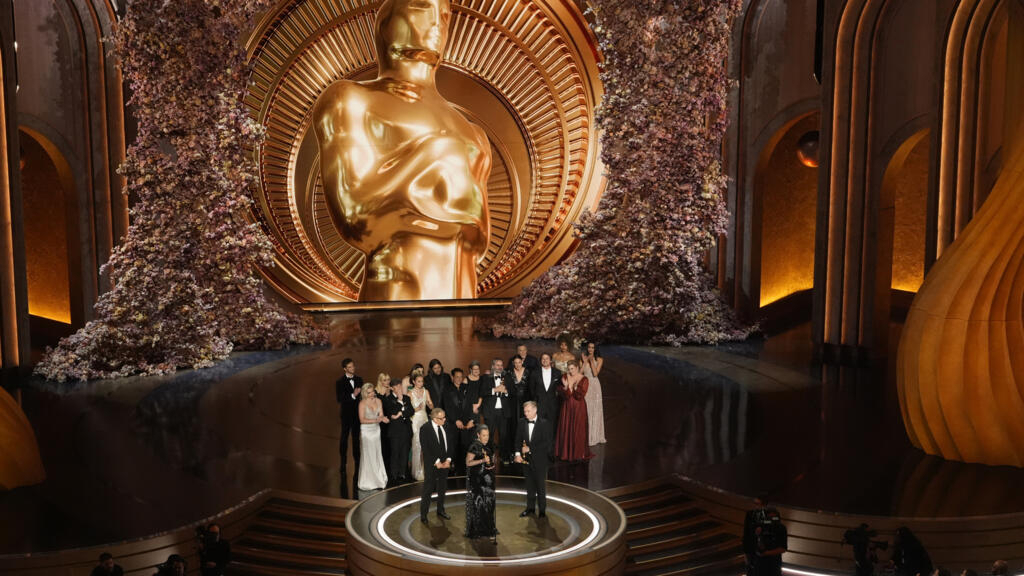
“Oppenheimer,” a solemn three-hour biopic that became an unlikely billion-dollar box-office sensation, was crowned best picture at a 96th Academy Awards that doubled as a coronation for Christopher Nolan.
After passing over arguably Hollywood’s foremost big-screen auteur for years, the Oscars made up for lost time by heaping seven awards on Nolan’s blockbuster biopic, including best actor for Cillian Murphy, best supporting actor for Robert Downey Jr. and best director for Nolan.
In anointing “Oppenheimer,” the Academy of Motion Pictures Arts and Sciences did something it hasn’t done for more than a decade: hand its top prize to a widely seen, big-budget studio film.
In a film industry where a cape, dinosaur or Tom Cruise has often been a requirement for such box office, “Oppenheimer” brought droves of moviegoers to theaters with a complex, fission-filled drama about J. Robert Oppenheimer and the creation of the atomic bomb.
“For better or worse, we’re all living in Robert Oppenheimer’s world,” said Murphy in his acceptance speech. “I’d like to dedicate this to the peacemakers.”
As a film heavy with unease for human capacity for mass destruction, “Oppenheimer” also emerged – even over its partner in cultural phenomenon, “Barbie” – as a fittingly foreboding film for times rife with cataclysm, man-made or not.
Sunday’s Oscars at the Dolby Theatre in Los Angeles unfolded against the backdrop of wars in Gaza and Ukraine, and with a potentially momentous US election on the horizon.
The most closely watched contest of the Academy Awards went to Emma Stone, who won best actress for her performance as Bella Baxter in “Poor Things.”
In what was seen as the night’s most nail-biting category, Stone won over Lily Gladstone of “Killers of the Flower Moon.” Gladstone would have become the first Native American to win an Academy Award.
Instead, Oscar voters couldn’t resist the full-bodied extremes of Stone’s “Poor Things” performance.
The win for Stone, her second best actress Oscar following her 2017 win for “La La Land,” confirmed the 35-year-old as arguably the preeminent big-screen actress of her generation.
The list of women to win best actress two or more times is illustrious, including Katharine Hepburn, Frances McDormand, Ingrid Bergman and Bette Davis.
“Oh, boy, this is really overwhelming,” said Stone, who fought back tears and a broken dress during her speech.
‘This incredible journey’
Sunday’s broadcast had razzle dazzle, including a sprawling song-and-dance rendition of the “Barbie” hit “I’m Just Ken” by Ryan Gosling, with an assist on guitar by Slash and a sea of Kens who swarmed the stage.
But protest and politics intruded on an election-year Academy Awards, where demonstrations for Gaza raged outside the Dolby Theatre in Los Angeles.
Late during the show, host Jimmy Kimmel read a critical social media post from former president Donald Trump.
“Thank you for watching,” said Kimmel. “Isn’t it past your jail time?”
Nolan has had many movies in the Oscar mix before, including “Inception,” “Dunkirk” and “The Dark Knight.”
But his win Sunday for direction is the first Academy Award for the 53-year-old filmmaker. Addressing the crowd, Nolan noted cinema is just over a hundred years old.
“We don’t know where this incredible journey is going from here,” said Nolan. “But to think that I’m a meaningful part of it means the world to me.”
Downey, nominated twice before (for “Chaplin” and “Tropic Thunder”), also notched his first Oscar, crowning the illustrious second act of his up-and-down career.
“I’d like to thank my terrible childhood and the academy, in that order,” said Downey, the son of filmmaker Robert Downey Sr.
“Barbie,” last year’s biggest box-office hit with more than $1.4 billion in ticket sales, ultimately won just one award: best song (sorry, Ken) for Billie Eilish and Finneas’ “What Was I Made For?” It’s their second Oscar, two years after winning for their James Bond theme, “No Time to Die.”
‘How do we resist?’
But after an awards season that stayed largely inside a Hollywood bubble, geopolitics played a prominent role.
Protests over Israel’s war in Gaza snarled traffic around the Dolby Theatre in Los Angeles, slowing stars’ arrival on the red carpet and turning the Oscar spotlight toward the ongoing conflict. Some protesters shouted “Shame!” at those trying to reach the awards.
Jonathan Glazer, the British filmmaker whose chilling Auschwitz drama “The Zone of Interest” won best international film, drew connections between the dehumanisation depicted in his film and today.
“Right now, we stand here as men who refute their Jewishness and the Holocaust being hijacked by an occupation which has led to conflict for so many innocent people, whether the victims of October the 7th in Israel, or the ongoing attack on Gaza, all the victims, this dehumanisation, how do we resist?”
The war in Gaza was on the minds of many attendees, as was the war in Ukraine. A year after “Navalny” won the same award, Mstyslav Chernov’s “20 Days in Mariupol,” a harrowing chronicle of the early days of Russia’s invasion of Ukraine, won best documentary.
The win, a first for The Associated Press and PBS’ “Frontline,” came as the war in Ukraine passed the two-year mark with no signs of abating.
Mstyslav Chernov, the Ukrainian filmmaker and AP journalist whose hometown was bombed the day he learned of his Oscar nomination, spoke forcefully about Russia’s invasion.
“This is the first Oscar in Ukrainian history,” said Chernov. “And I’m honored. Probably I will be the first director on this stage to say I wish I’d never made this film. I wish to be able to exchange this (for) Russia never attacking Ukraine.”
In the early going, Yorgos Lanthimos’ Frankenstein-riff “Poor Things” ran away with three prizes for its sumptuous craft, including awards for production design, makeup and hairstyling and costume design.
Kimmel, hosting the ABC telecast for the fourth time, opened the awards with an monologue that emphasised Hollywood as “a union town” following 2023’s actor and writer strikes, drew a standing ovation for bringing out teamsters and behind-the-scenes workers — who are now entering their own labor negotiations.
Best screenplay for French film ‘Anatomy of a Fall’
The night’s first award was one of its most predictable: Da’Vine Joy Randolph for best supporting actress, for her performance in Alexander Payne’s “The Holdovers.” An emotional Randolph was accompanied to the stage by her “Holdovers” co-star Paul Giamatti.
“For so long I’ve always wanted to be different,” said Randolph. “And now I realise I just need to be myself.”
Though Randolph’s win was widely expected, an upset quickly followed. Hayao Miyazaki’s “The Boy and the Heron” won for best animated feature, a surprise over the slightly favored “Spider-Man: Across the Spider-Verse.”
Miyazaki, the 83-year-old Japanese anime master who came out of retirement to make “The Boy and the Heron,” didn’t attend the ceremony. He also didn’t attend the 2003 Oscars when his “Spirited Away” won the same award.
Best original screenplay went to “Anatomy of a Fall,” which, like “Barbie,” was penned by a couple: director Justine Triet and Arthur Harari. “This will help me through my midlife crisis, I think,” said Triet.
In adapted screenplay, where “Barbie” was nominated — and where some suspected Greta Gerwig would win after being overlooked for director — the Oscar went to Cord Jefferson, who wrote and directed his feature film debut “American Fiction.”
He pleaded for executives to take risks on young filmmakers like himself.
“Instead of making a $200 million movie, try making 20 $10 million movies,” said Jefferson, previously an award-winning TV writer.
The Oscars belonged largely to theatrical-first films. Though it came into the awards with 19 nominations, Netflix was a bit player.
Its lone win came for live action short: Wes Anderson’s “The Wonderful Story of Henry Sugar,” based on the story by Roald Dahl.
Historically, having big movies in the mix for the Oscars’ top awards has been good for broadcast ratings.
The Academy Awards’ largest audience ever came when James Cameron’s “Titanic” swept the 1998 Oscars.
(AP)
Politics
‘Noon against Putin’: A small gesture and a powerful symbol of Russia’s opposition
The widow of Russia’s late opposition leader Alexei Navalny is calling on voters in the country’s presidential election to turn up at polling stations en masse at 12 noon on March 17 and either vote against Vladimir Putin or spoil their ballot. The protest action, known as “Noon Against Putin”, aims to honour Navalny’s last wishes, while illustrating the high number of voters who are against Russia’s war on Ukraine.
President Vladimir Putin is hoping for record turnout in the country’s forthcoming March 15-17 elections. And now the Russian strongman, who is seeking a fifth term in office in a tightly controlled vote, might find his wish has been granted.
But if voters turn out in high numbers on March 17 at noon sharp, Putin might feel he should have been careful what he wished for.
The “Noon against Putin” protest action was called for by the late Alexei Navalny two weeks before his death in an Arctic prison, and is now being continued by his widow Yulia.
Promoters of the protest want Russians to wait until noon on March 17 to go to their polling station. They don’t care which candidate they vote for – as long as it’s not Putin and as long as they come precisely at noon.
“The choice is yours. You can vote for any candidate except Putin,” Navalnaya said in a YouTube video.
“You can ruin the ballot, you can write ‘Navalny’ in big letters on it. And even if you don’t see the point in voting at all, you can just come and stand at the polling station, and then turn around and go home.”
Russia’s presidential election is widely expected to hand Putin another six-year term, keeping him in the Kremlin until at least 2030. The vote is being held with no meaningful opposition challengers and international observers have already raised concerns about its transparency and accountability.
Navalnaya views the polling protest as a gesture of support for the Russian opposition and a powerful way for citizens to show they are against Russia’s war on Ukraine.
Indeed the protest action may be the only thing motivating Russians who are against Putin to turn out and vote.
“How many people will show up is the only interesting figure in these elections,” says Matthew Wyman, a specialist in Russian politics at Keele University in the UK.
‘Navalny’s political legacy’
“We have to sabotage it [the election],” says Maxim Reznik, an exiled Russian opposition figure who came up with the idea for the initiative, when interviewed by independent Russian news website Meduza.
Reznik first suggested the protest action during a debate – “What to do about the presidential election?” – broadcast in January 2024 on the opposition channel Dozhd.
Since then, most of Russia’s leading opposition figures have voiced their support for the “Noon Against Putin” initiative, starting with Navalny’s anti-corruption foundation, which rarely misses an opportunity to promote it.
Novaya Gazeta, the independent Russian newspaper, has even called the protest action “Navalny’s will”.
“It’s very appropriate to link it to Navalny because it’s the kind of thing he would have done,” Wyman points out.
“It is in the spirit of a lot of things Navalny was doing and asking people to do: it’s not difficult, and with small steps you can hope to make big changes,” adds Jenny Mathers, a specialist in Russia at Aberystwyth University in Wales.
“Noon against Putin” ties in perfectly with this strategy. Going to the polling station at a specific time calls for no particular effort from voters – neither does it put them at risk.
“What they are doing is trying to find ways to show resistance without risk of being put in jail. The protest is brilliant because they are doing exactly what the regime wants you to do: going to vote,” says Wyman, adding that the police would find it hard to justify arresting voters for doing their civic duty.
Mathers suggests it is important to start with small steps.
“The idea is to rebuild civil society and a credible opposition force that has been badly hit lately,” she notes. “After small steps, maybe a bigger one will come? I see it as one piece of a long-lasting campaign,” Mathers adds.
The number of Russians opposed to the war
This type of protest action illustrates “the creativity of actions undertaken by the opposition in Russia”, explains Wyman, adding that “the space to protest has been kind of reduced and reduced”.
“Noon against Putin” is just one of a long list of initiatives in a similar vein. Demonstrators have held up blank sheets of paper to symbolise the censorship of any criticism of Russia’s war on Ukraine, and activists have added QR codes to advertising billboards so that citizens can access websites critical of Putin.
“These are the kind of practices you see in regimes that become more and more oppressive,” says Mathers.
“It is like what China does, when they use Winnie the Pooh,” adds Mathers, referring to China’s ban of a Winnie the Pooh film after the Chinese used memes to mock their leader Xi Pingping by comparing him to the honey-loving bear.
Some wonder if the protest action will have any real impact.
“Obviously it’s not going to change the outcome of the election,” admits Mathers.
However, Wyman believes it will give a “better picture” of the strength of the opposition to the war on Ukraine.
The vast crowds that gathered for Navalny’s funeral on March 1 have already given some insight into the feeling of dissent in Russia. At least 27,000 people came to say farewell to Navalny at Borisovsky cemetery on the outskirts of Moscow, according to a count by the independent Russian news outlet Mediazona.
But Stephen Hall, a Russia specialist at the University of Bath, predicts that voter turnout will be much higher than it was for Navalny’s funeral – pointing out that it was mainly Muscovites who attended, and that police had warned people to stay away.
“Here the risk of arrest is low and it’s [taking place] all over Russia.
“This is a low risk way to show you’re against the regime and the war.”
Stealing the media limelight from Putin
Hall believes one of “Noon Against Putin’s” main challenges will be mobilising people outside of Moscow or St Petersburg.
“Putin has always counted on popular support on the outskirts of major urban centres. If long queues form in front of polling stations all over Russia at midday on Sunday, he may start to worry about the real level of his popularity,” he explains.
“Noon against Putin” also aims to steal the media spotlight from the Kremlin.
“The regime wants this election to be non-controversial. So the more disruption there is, like huge numbers going to polling stations at noon, the more this might be a problem for Putin,” says Mathers.
“Putin desperately wants all the world headlines after the election to say he ‘got 85 percent’,” says Reznik.
“But now, rest assured, you’ll see! All the headlines won’t be about Putin’s performance but about what happened at ‘Noon’,” Reznik adds.
“It’s about creating a counter-narrative,” agrees Matthew Wyman.
This is partly so that Russians opposed to the regime do not feel alone, but it’s also “a way to say to the world we are not all Putin, and that there is a movement to support in Russia”, adds Mathers.
But for that to happen, voters will need to turn out in high numbers at polling stations at noon on Sunday.
This article has been translated from the original in French.
Politics
US House of Representatives overwhelmingly passes TikTok ban bill
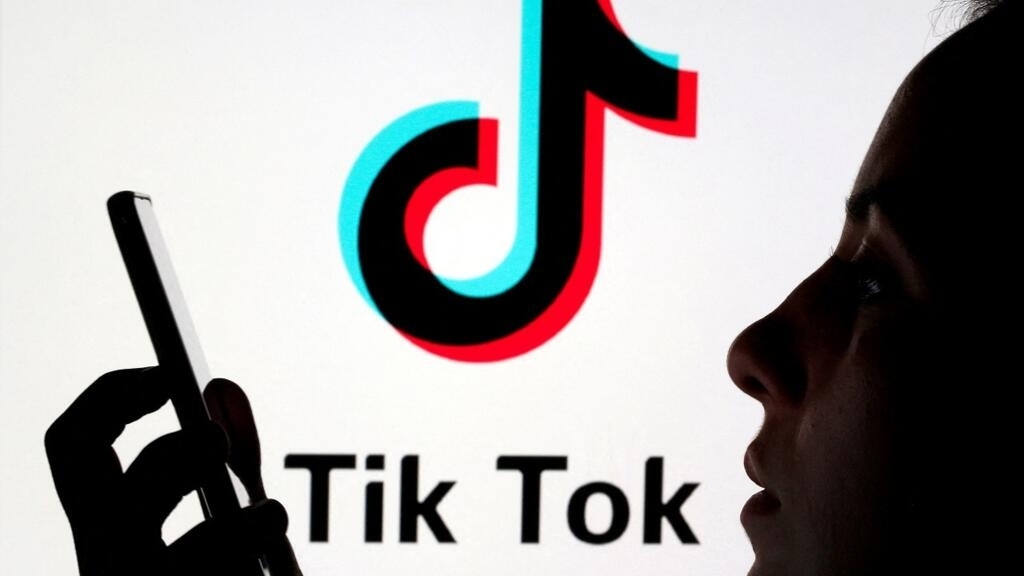
The US House of Representatives overwhelmingly approved a bill on Wednesday that would force TikTok to divest from its Chinese owner or be banned from the United States.
Issued on:
2 min
The legislation is a major setback for the video-sharing app, which has surged in popularity across the world while causing nervousness about its Chinese ownership and its potential subservience to the Communist Party in Beijing.
The lawmakers voted 352 in favor of the proposed law and 65 against, in a rare moment of unity in politically divided Washington.
“Today’s bipartisan vote demonstrates Congress’ opposition to Communist China’s attempts to spy on and manipulate Americans, and signals our resolve to deter our enemies,” Republican House Speaker Mike Johnson said after the vote.
“I urge the Senate to pass this bill and send it to the President so he can sign it into law,” he added.
But the fate of the bill is uncertain in the more cautious Senate, where some key figures are apprehensive of making such a drastic move against an app that has 170 million US users.
President Joe Biden will sign the bill, known officially as the Protecting Americans from Foreign Adversary Controlled Applications Act, into law if it came to his desk, the White House has said.
“This process was secret and the bill was jammed through for one reason: it’s a ban,” said a spokesperson for TikTok in a statement.
“We are hopeful that the Senate will consider the facts, listen to their constituents, and realize the impact on the economy, 7 million small businesses, and the 170 million Americans who use our service,” the spokesperson added.
The measure, which only gained momentum in the past few days, requires TikTok’s parent company ByteDance to sell the app within 180 days or see it barred from the Apple and Google app stores in the United States.
It also gives the president power to designate other applications to be a national security threat if they are under the control of a country considered adversarial to the US.
The renewed campaign against TikTok came out of the blue to the company, the Wall Street Journal reported, with TikTok executives reassured when Biden joined the app last month as part of his campaign for a second term.
TikTok CEO Shou Zi Chew is in Washington, trying to stop progress on the bill.
The Trump factor
China warned on Wednesday that the move will “inevitably come back to bite the United States.”
“Although the United States has never found evidence that TikTok threatens US national security, it has not stopped suppressing TikTok,” foreign ministry spokesperson Wang Wenbin said, condemning it as “bullying behavior.”
Republican lawmakers approved the bill, in an unusual act of defiance against Donald Trump.
In a turnaround from his earlier stance, Trump on Monday said he was against a ban, mainly because it would strengthen Meta, the owner of Instagram and Facebook, which he called an “enemy of the people.”
When Trump was president, he attempted to wrest control of Tiktok from ByteDance, but was blocked by US courts.
“I think it will die in the Senate,” said representative Nancy Mace, a Trump ally. “This is not our job to do this.”
Other efforts to ban TikTok have failed, with a bill proposed a year ago getting nowhere largely over free speech concerns.
Similarly, a state law passed in Montana banning the platform was suspended by a federal court on the suspicion that it violated constitutional free speech rights.
TikTok staunchly denies any ties to the Chinese government and has restructured the company so the data of US users stays in the country with independent oversight, the company says.
(AFP)
Politics
Charles de Gaulle’s eldest son, Philippe de Gaulle, dies aged 102
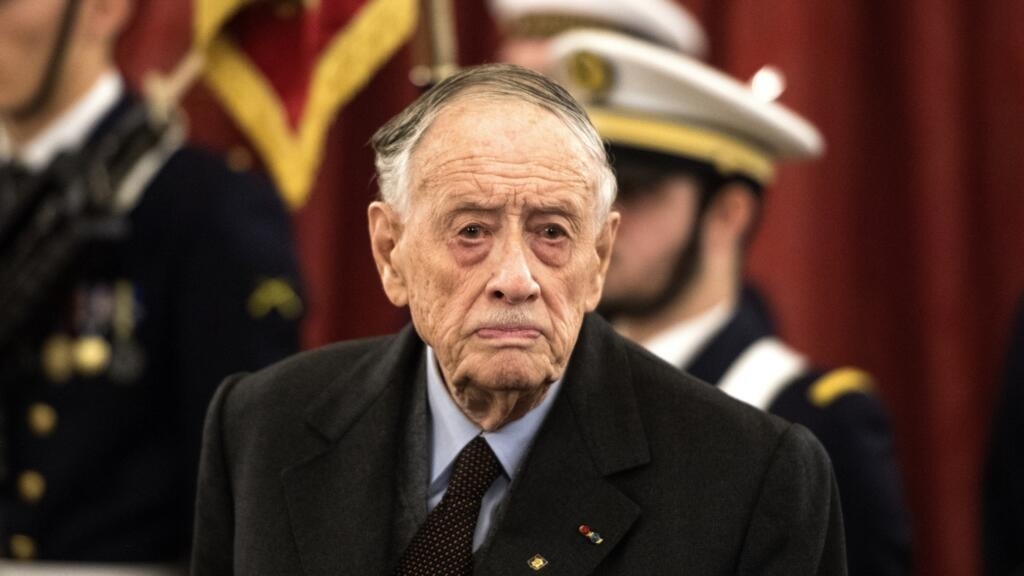
The eldest child of French World War II Resistance leader and first postwar president Charles de Gaulle, has died aged 102, the family said on Wednesday.
Issued on:
2 min
Philippe de Gaulle, who was a significant military figure in his own right, heeded his father’s call to join Free French forces in the fight against Nazism in World War II.
He later had a successful naval career, rising to the rank of admiral, and also became a senator.
Despite a striking physical resemblance, he was a more low-key figure than his father but devoted himself to preserving the memory of Charles de Gaulle, notably through numerous books including the successful work “De Gaulle, my father”.
His son Yves de Gaulle told AFP that he died overnight from Tuesday to Wednesday in the Invalides in central Paris, the French military institution where he had lived for two years.
Les armées s’inclinent devant la disparition de l’amiral Philippe de Gaulle. De la fougue du combattant de la France Libre à la finesse de l’officier général, son parcours continuera de guider les générations sous les armes. Saluons l’engagement d’une vie au service de la 🇫🇷. pic.twitter.com/xHxmNtLMSS
— Chef d’état-major des armées (@CEMA_FR) March 13, 2024
“Philippe de Gaulle anticipated his father’s call to join the Resistance,” President Emmanuel Macron wrote in a tribute on X.
“Sailor, admiral, senator, he never came up short when courage and honour were required. A century of French bravery.”
Macron opened a cabinet meeting Wednesday with a tribute to Philippe de Gaulle and would hold a national memorial ceremony at the Invalides next week in his memory, government spokeswoman Prisca Thevenot said.
Eric Ciotti, head of the right-wing Republicans party that sees itself as the inheritor of de Gaulle’s political mantle, described Philippe de Gaulle as a “pillar” of France.
“His life dedicated to the service of France, in the navy and in the Senate, was a living example for the Republic,” he wrote on X.
“France was in his heart until the end,” added Defence Minister Sebastien Lecornu.
‘Not easy’
He joined the Free French Naval Forces in 1940 and fought in the North Atlantic until 1944, then in France itself when the Resistance joined the Allies in pushing the Nazis out of France, taking part in the Normandy Landings of D-Day.
After the war, he saw action during post-colonial conflicts in Indochina (modern day Cambodia, Laos and parts of Vietnam and China), Morocco and Algeria.
Charles de Gaulle was wary of the slightest hint of nepotism and never helped his son win a post, nor did he decorate him with the Order of Liberation after the war.
The upbringing of Charles de Gaulle’s three children was austere, with their mother Yvonne said to only kiss Philippe and his two sisters on their birthday and December 31.
The eldest of the sisters, Elisabeth died in 2013 while the youngest of the children Anne, who suffered from Down Syndrome, died in 1948 aged just 20.
“I know everything, my boy. Your position has never been easy. It’s not nothing to be the son of General de Gaulle,” he was told on one occasion by his father.
“But your attitude has always been the one I expected of you,” said Charles de Gaulle.
Nicolas Lacroix, the president of the Charles de Gaulle memorial in the eastern town of Colombey-les-deux-Eglises where de Gaulle lived before World War II and died in 1970, said Philippe de Gaulle would be buried opposite his father in the local cemetery and alongside his wife Henriette, his mother Yvonne and sister Anne.
“Our country has lost one of its great defenders. Gaullism has lost one of its greatest ambassadors,” he said, adding the French flag would be at half mast at the memorial until the burial takes place.
(AFP)
-
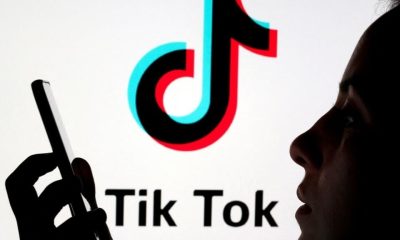
 Politics4 months ago
Politics4 months agoUS House of Representatives overwhelmingly passes TikTok ban bill
-

 Business7 months ago
Business7 months agoThe first minds to be controlled by generative AI will live inside video games
-

 Business7 months ago
Business7 months agoIndia is a ‘perfect’ emerging market for investors, ETF expert suggests
-

 Business7 months ago
Business7 months agoNike sinks 10% after it slashes sales outlook, unveils $2 billion in cost cuts
-
Business7 months ago
3 recent success tips from Mark Cuban, including what to keep in mind if you want to be a millionaire
-

 Business4 months ago
Business4 months agoJustice for AKA and Tibz | Unpacking the Ndimande brothers’ extradition
-
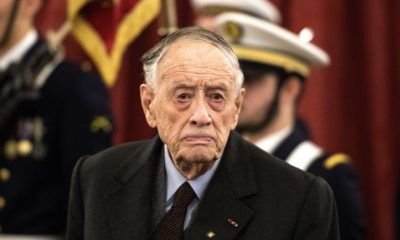
 Politics4 months ago
Politics4 months agoCharles de Gaulle’s eldest son, Philippe de Gaulle, dies aged 102
-

 Business4 months ago
Business4 months agoFones 4 Africa: Where Quality Meets Affordability




